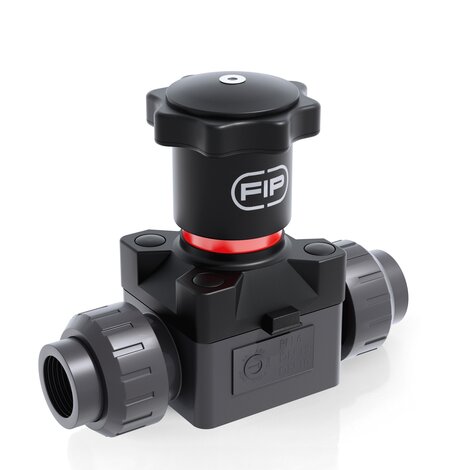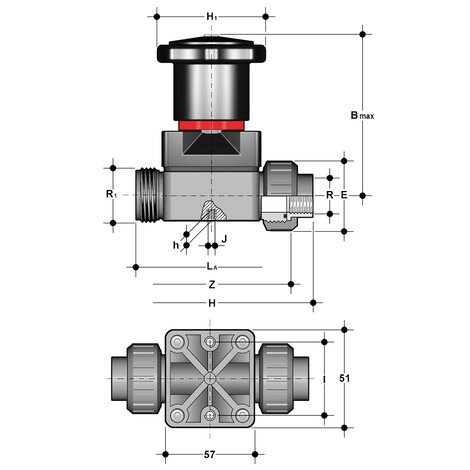
CMUFV - Compact diaphragm valve DN 12:15
Compact diaphragm valve with BSP threaded female union ends unions.
The CM is a manually operated diaphragm valve of reduced dimensions and particularly compact structure, ideal for use in confined spaces.
Main features:
- Handwheel in PA-GR, completely sealed, high mechanical strength with ergonomic grip for optimum manageability
- Integrated adjustable torque limiter designed to prevent excessive compression of the diaphragm and always guarantee a minimum fluid flow
- Optical position indicator supplied as standard
- Bonnet in PA-GR with STAINLESS steel nuts fully protected by plastic plugs to eliminate zones where impurities may accumulate. Internal circular and symmetrical diaphragm sealing area
- STAINLESS steel bolts, can also be inserted from above
- Threaded metal inserts for anchoring the valve
EPDM
| Reference | system | Category | family | series | R | DN | PN | B max | E | H | H1 | h | I | J | La | R1 | Z | g |
|---|---|---|---|---|---|---|---|---|---|---|---|---|---|---|---|---|---|---|
| CMUFV012E | PVC-U system | Manual valves | Diaphragm valves | CM DN 12÷15 | 1/2” | 15 | 6 | 86 | 41 | 129,5 | 58,5 | 8 | 35 | M5 | 90 | 1” | 97,5 | 285 |
FKM
| Reference | system | Category | family | series | R | DN | PN | B max | E | H | H1 | h | I | J | La | R1 | Z | g |
|---|---|---|---|---|---|---|---|---|---|---|---|---|---|---|---|---|---|---|
| CMUFV012F | PVC-U system | Manual valves | Diaphragm valves | CM DN 12÷15 | 1/2” | 15 | 6 | 86 | 41 | 129,5 | 58,5 | 8 | 35 | M5 | 90 | 1” | 97,5 | 285 |
PTFE
| Reference | system | Category | family | series | R | DN | PN | B max | E | H | H1 | h | I | J | La | R1 | Z | g |
|---|---|---|---|---|---|---|---|---|---|---|---|---|---|---|---|---|---|---|
| CMUFV012P | PVC-U system | Manual valves | Diaphragm valves | CM DN 12÷15 | 1/2” | 15 | 6 | 86 | 41 | 129,5 | 58.5 | 8 | 35 | M5 | 90 | 1” | 97,5 | 285 |
- Connection system for solvent weld and threaded joints
- Extremely compact construction
- Internal operating components in metal totally isolated from the conveyed fluid
- Valve stem in STAINLESS steel
- Compressor with floating diaphragm support
- Easy to replace diaphragm seal
- Corrosion-proof internal components
- CDSA (Circular Diaphragm Sealing Angle) system offering the following advantages:
- uniform distribution of shutter pressure on the diaphragm seal
- reduction in the tightening torque of the crews fixing the actuator to the valve body
- reduced mechanical stress on all valve components (actuator, body and diaphragm)
- easy to clean valve interior
- low risk of the accumulation of eposits, contamination or damage to the diaphragm due to crystallisation
- operating torque reduction




 get_app
get_app
 get_app
get_app